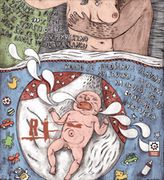

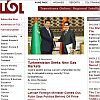
Keywords: Tajikistan, Kazakhstan, Kyrgyzstan, Uzbekistan, economy, Steve Jobs, Tim Cook, Apple, Russia, gay law, Adriatic, oil, Croatia, Ukraine, NATO, Philip Breedlove, Ask.fm, Ireland, Latvia;
Plus, oil majors compete for Croatian oil and gas tenders; Latvia’s controversial Ask.fm teen site relocates to Ireland. Around the Bloc is TOL's daily digest of the important, the trivial, the tragic, the weird, and the sober from its coverage region.
More...
Keywords: Federica Mogherini; EU; Kosovo; EULEX; Mongolian; Norov Altankhuyag; Azerbaijani; SOCAR; oil; Romania; Russi;
Plus, SOCAR’s purchase of Greek company comes under scrutiny, and an aged Romanian accused of murdering dissidents says he was only following orders. Around the Bloc is TOL's daily digest of the important, the trivial, the tragic, the weird, and the sober from its coverage region.
More...
Keywords: Petro Poroshenko; Ukraine; Georgia; Bosnia; Donetsk; Maya Panjikidze; Irakli Garibashvili; Irakli Alasania; Hungary; MOL; Ivo Sanader;
Plus, a Bosnian court strikes down the ‘two schools under one roof’ policy, and Washington ups the ante in its high-stakes influence game with Budapest. Around the Bloc is TOL's daily digest of the important, the trivial, the tragic, the weird, and the sober from its coverage region.
More...
Keywords: Vladmir Putin; Russia; Edgars Rinkevics; Latvia; Vladimir Linderman; Belarus; HRW; Poland
Plus, Belarus expels a rights activist over traffic violations and a right-wing Polish politician says his case proves the ubiquity of police brutality. Around the Bloc is TOL's daily digest of the important, the trivial, the tragic, the weird, and the sober from its coverage region.
More...
Keywords: Solidarity; Poland; Eastern Europe; industry; songs; Jacek Kaczmarski; lluis llach; catalonia; Emilian Kaminski;
A tale of two songs that brought East and West together through the ambiguity of metaphor.
More...
Keywords: Dusan Petricic; cartoon; art; Canada; Serbia; Milosevic; Yugoslavia;
The cartoonist Dusan Petricic has inspired generations of children to stick to basic rules. He’s now applying the same methods to grown-ups.
More...
Keywords: Russia; children; Down Syndrome; orphanage; St. Petersburg; disabilities; disabled; Institutionalization;
In Russia, parents of babies with developmental disabilities face pressure from both society and the medical establishment to abandon their children at birth.
More...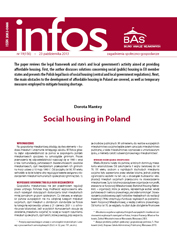
Keywords: Poland; Eu; social housing;
The paper reviews the legal framework and state’s and local government’s activity aimed at providing affordable housing. First, the author discusses solutions concerning social (public) housing in EU member states and presents the Polish legal basis of social housing (central and local government regulations). Next, the main obstacles to the development of affordable housing in Poland are covered, as well as temporary measures employed to mitigate housing shortage.
More...Keywords: Denmark's foreign policy;
The year 1989 rendered a significant change for Denmark. For more than one century the country had to pursue a very passive foreign policy and its position was determined first by Germany (after the defeat in the Prussian-Austrian War in 1864) and later by the USSR (during the Cold War). The end of the Cold War brought about a new impulse for Copenhagen.
More...Keywords: Non-Military Aspects of Lithuania Safety Politics;
The Republic of Lithuania won its independence again in 1990 after the dissolution of the bipolar world. The young state had to form its own foreign and security policy, which needed to correspond with new international security environment.This article uses the Copenhagen school security concept as the framework for analysis, which makes possible to study non-military aspects of Lithuanian security policy, various reference objects and securitizing actors. We study economical threats like the lack of strategic resources, environmental threats like the possibility of accident in the Lithuanian power plant Ignalina or in Russian North-Western power plants and social-cultural threats like organized crime. Finally, we analyze the Copenhagen security concept and its usefulness as an analyzing framework.
More...Keywords: the American unilateralism after 9/11; America’s unequalled military power; America’s cultural identity;
Is the American unilateralism after 9/11 fueled by a realization of America’s unequalled military might in the world, or is it an expression of America’s cultural identity? The former explanation tends to describe the current American policy as “realist”, the latter describes it as “idealist”. This article argues that these two explanations may complement each other if we conceive of current American discourse as a combination of the “vulgar realism of force” and the “substantive idealism of good”. This synthesis of realism and idealism gravitates towards the idealistic pole since it is motivated by a profoundly idealistic desire to flee from “the autonomy of the political”, defended by classical realists from Machiavelli to Nietzsche and from Schmitt to Morgenthau and Kissinger.
More...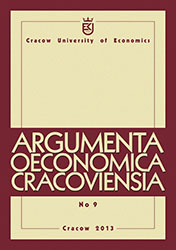

Keywords: global imbalances; exorbitant privilege; post-Bretton Woods system; financial crisis; current account; exchange rates
The issue of global imbalances already emerged in the pre-crisis era, albeit in a different context. Research was mostly concentrated on analysing how distortions in the external positions of the main countries would affect future turbulence on foreign exchange markets and in the real sector before reaching new equilibrium points. This article addresses the problem in a different manner by describing the causal link between monetary and fiscal expansion and the resulting increase in trade deficit. The process of reinvestment of foreign exchange reserves by surplus countries affects credit, stock and real estate markets, thus paving the way for future turmoil.
More...
Keywords: human resource development; international assignments; expatriates; HRD value proposition
The article presents the role of Human Resource Development (HRD) in the process of international assignments by identifying how analyses and interventions taken under HRD add value for expatriates and for multinational enterprises. The study is of a conceptual nature and is based mainly on an analysis of the subject literature, the purpose of which is to identify the essence and features of strategic and international HRD and, on this basis, to prepare a model depiction of HRD impact on the creation of values in the process of international assignments.
More...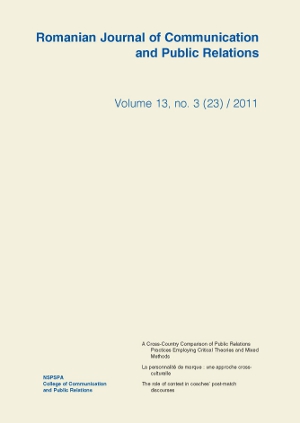
Keywords: proactive communication; crisis communication; pre-crisis; crisis prodromes; signal detection
Crisis communication, as an essential part of crisis management, is a major challenge for organizations, especially the business within the current communication framework. As the stakeholders’ perceptions represent very often the greatest potential danger in crises, communication plays quite frequently an important role in the organizational efforts to control, contain, and resolve a crisis situation. The absence or insufficiency of crisis communication management is a major threat to the organizational achievements because of significant financial losses generated by inadequate stakeholder perceptions. We have initiated a research in this field, with special attention to the Romanian business situation. The first empirical step of our research sought to determine to what extent Romanian business organizations are perceived as being aware of this challenge. A survey has confirmed that they are perceived by their stakeholders as quite unaware, as not acting on a planned basis as far as organizational crises are concerned. Based on this initial empirical research, in order to help business organizations to be seen as reliable actors in crisis situations, we have made a preliminary checklist with “prodromes” (symptoms) to be considered both by business managers and communication strategists while planning for crisis management.
More...
Keywords: project management; team development model; project communication; social competences; Emotional Intelligence (EQ)
This paper seeks to investigate the communication role of the Project Manager when it comes to coordinating the project team. Our research aims at identifying to what extent the self-understanding of the project manager influences the communication styles he/she promotes in driving the project team from the “Forming” to the “Performing” stage of team development, as conceptualized by Bruce Tuckman. We expect to find a connection between the stages of team development and the Project Life Cycle. The findings show that PMs in Romania are generally aware of their role of key communicators in the project and consciously adapt their communication style to the needs of the team members and to specific situations. Although most of the PMs are self and social aware, they place different importance on emotions in the decision-making process. The research shows that PMs adopt different patterns of team development according to the type of organization they belong to, their experience, age, the organizational or project constraints. Results show that there are certain specific context-related features which act either as obstacles or as incentives for reaching team performance when implementing projects and which diminish PMs’ perceived contribution in driving the project team to the “Performing” stage.
More...

Keywords: communication contract; sport courtesy; social comparison; positive face; coaches’ discourses
Nowadays, when there are liquid boundaries between sports and other social areas of life in terms of values, communication or behaviour models, analysing the impact of social context upon sport actors’ discourses could provide interesting insights regarding the socially situated nature of discourses. The focus of this study case is on the impact that the context has upon coaches’ public discourses and, moreover, on how they define and position themselves towards other sports’ actors. Based on a corpus of coaches’ discourses during the post-match press conferences from an international handball competition, there are two main dimensions of analysis: the contractual/situational one and the relational one. While, the compelling force of the communication contract of press conferences determines a high level of similarity between coaches’ discourses, the sport courtesy speech acts work both as a way of establishing a consensual frame of interaction between the participants, as well as a way of building and maintaining a positive face for the speaker and his team.
More...
Keywords: Democracy; Dayton Agreement; European Union; Minority Groups; Ethno-nationalism
In spite of the fact that more than a decade Bosnia and Herzegovina has been going through deep European Union-related reform processes the country is still facing troubles in terms of its democratic progress. For instance, the post-Dayton public discourse has been characterised by ideological domination of the nationalist political elites which are doing very little to include the so-called non-nationalists and a members of several minority groups from public policy-making. As a result Bosnia is facing serious democratic deficit since one of the most fundamental objectives of Bosnia's EU reforms processes has been eradication of a dangerous politics of nationalists or 'ethnic fascists'. Thus, in this paper the main focus was on the theme of the post-Dayton ethnic projects which have brought about massive discrimination against the non-constituents and a so-called Others as they are referred to at the constitutional framework. Better to say, in the post-war Bosnia democratic inclusion has turned into a competition between the country's three biggest national communities, Bosnian Muslims or Bosniaks, Bosnian Serbs, and Bosnian Croats. Overall, Bosnian citizens still live in the political system which is largely based on ethnic-nationalist paradigm or ethnocracy rather than democratic political system. Therefore, Bosnia which is largely discriminating against significant number of its citizens can not enter the European Union as such.
More...